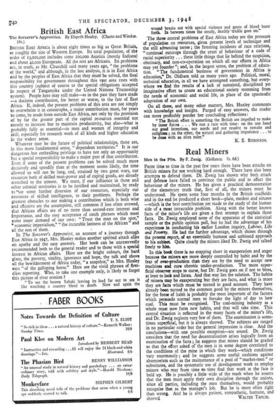Real Miners
Men in the Pits. By F. Zweig. (Gollancz. 7s. 6d.)
FROM time to time in the past few years there have been attacks on British miners for not working hard enough. There have also been attempts to defend them. Dr. Zweig has shown why both attack and defence have failed to convince the public and to affect the behaviour of the miners. He has given a practical demonstration of the elementary truth that, first of all, the miners must be understood. He spent some four months in the British coalfields and in the end he produced a short book—plain, modest and sincere —which is the best contribution yet made to the study of the human side of a most intractable problem. Along with the better known facts of the miner's life are given a first attempt to explain those facts. Dr. Zweig employed none of the apparatus of the statistical sample or the public opinion poll, but he had the advantage of his experience in conducting his earlier London inquiry, Labour, Life and Poverty. He had the further advantage, which shines through the present report, of an essentially humane and unbiased approach to his subject. Quite clearly the miners liked Dr. Zweig and talked freely to him.
In this book there is no stopping short in exasperation and anger because the miners are more deeply controlled by habit and by the fear of over-production than they are by the need to accept new machines and cure chronic under-production. The more super- ficial observer stops to curse but Dr. Zweig goes on if not to bless, at least to look and listen. And that way lies the solution. The habits of miners may be exasperating but they are facts, and what is more they are facts which must be turned to good account. They have already been turned to the common good by the miners themselves, for the force of habit is probably the most important of the factors which persuade normal men to forsake the light of day to hew coal. This must be recognised. The coal-mining industry as a whole must now form new habits, and that will take time. This central situation is reflected in the many facets of the miner's life, and Dr. Zweig neglects very few of them. The examination is some- times superficial, but it is always shrewd. The subjects are ranged in no particular order but the general impression is clear. And the conclusions—with one possible exception—are sound. Dr. Zweig considers that the need for decentralisation arises logically from an examination of the facts ; he suggests that mines should be graded so that the effort asked or the men is in some degree correlated to the conditions of the mine in which they work—which conditions vary enormously ; and he suggests some useful cushions against absenteeism such as the maintenance of a pool of " market-men " or substitutes, and the systematic use of development work to employ miners who may from time to time find that work at the face is held up. He is possibly a little wide of the mark when he asserts that the men must apply their own discipline through the unions, since all parties, including the men themselves, would probably recognise that as the manager's job. But he is more often right than wrong. And he is always patient, sympathetic, humane, and


































 Previous page
Previous page